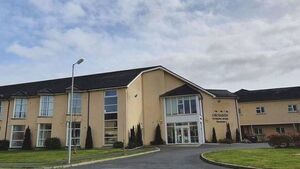Stradbally nursing home gets poor HIQA report

The HIQA risk assessment inspection report found that Droimnin Nursing Home was not compliant in eight out of nine categories. File pic
ANOTHER privately owned nursing home in Laois has received a poor report from the Health Information and Quality Authority (HIQA).
Droimnín Nursing Home in Stradbally was found to be non-compliant in eight out of nine categories, during an unannounced inspection last April.
The report published this July followed an unannounced risk inspection of the home on 8 April by HIQA inspectors.
The centre provides accommodation for a maximum of 70 residents on a long-term residential, respite and convalescence basis. On the day of the inspection, there were 69 present.
HIQA reported that it received “mixed feedback” from residents they spoke with on the day of the inspection.
The management structure in the nursing home had changed since its previous inspection, However, inspectors found that while there was a sustained presence of the senior management, this was not found to have positively impacted the overall governance and management of the centre.
Residents told inspectors that their rights were not always upheld, including limited choice around their daily routines such as when to get up from bed or to shower.
The report said: “Residents were not always supervised in communal areas and call bells were not within reach for some residents, leaving them unable to request help when needed. This posed a risk to their safety and did not uphold their dignity.”
A review of the complaints register found a number of recent complaints relating to residents waiting to have their call bells answered. However, a review of monthly call bell audits from January 2025 to April 2025 found 100% compliance in relation to call bell response times.
The directory of residents, reviewed on the day of inspection, did not contain details in relation to any deceased or discharged residents.
Inspectors observed residents experiencing prolonged waits for assistance with their morning care and being frequently left unsupervised in communal areas.
Inspectors found that the staffing levels and skill mix were not sufficient to meet the residents’ overall needs, as some staff were frequently redeployed from their assigned roles.
They found that, although all staff had received fire safety training, there was a lack of clarity among staff regarding the evacuation needs of a resident with complex care needs, identifying potential gaps in the effective application of training to practice.
Residents who spoke with the inspectors voiced concern with regard to staffing levels. They reported “and were observed” waiting long periods of time to receive assistance with their care needs.
A review of the record management systems in the centre found that records were not managed in line with regulatory requirements. For example, staff rosters did not reflect the staffing levels on the day of inspection. Staff receiving induction were not included on the roster. Staff personnel files did not contain all the necessary information required by the regulations.
One staff file did not contain two written references. Two staff files did not contain a full employment history. Nursing records were not completed in line with requirements. A review of residents’ nursing records found that multiple nursing notes were duplicated from previous entries.
HIQA found that complaints were not recorded and managed in line with the centre’s own policy and the requirements of the regulation.
“For example, a complaint received on behalf of a resident was logged in the complaints register, however, no investigation had been completed and no follow up action was taken to address the complaint. A resident’s report of dissatisfaction with the service had not been documented and managed in line with the centre’s complaints policy.”
Inspectors found that residents’ care needs were not appropriately assessed prior to their admission, which impacted on the care they received upon admission to the centre. Furthermore, care was not always provided to residents in line with their care plans or the recommendations of health and social care professionals.
Inspectors reviewed residents' assessments and care plans and found that, although all residents had a care plan in place, these plans were not always based on a comprehensive assessment of their care needs or reflective of their actual care needs.
In addition, pre-admission assessments were found to be incomplete and did not adequately identify residents care needs or the supports, interventions and resources necessary to meet those needs safely or effectively.
A review of residents’ records found that there was regular communication with residents’ general practitioners regarding their health care needs. Residents could also access the expertise of health and social care professionals such as physiotherapists, occupational therapists, dietitian services and tissue viability nursing expertise.
However, inspectors found that residents were not always referred for specialist input when clinically indicated and recommendations made by health care professionals were not always implemented.
Inspectors found that appropriate action had not been taken to investigate incidents or allegations of abuse, in line with the centre’s own policy. In addition, where deficits in staff knowledge regarding safeguarding had been identified, reasonable measures had not been taken to ensure that staff received appropriate training.
A review of a sample of residents’ assessment and care plans found that they were not in line with the requirements of the regulations. It was also found that the provider failed to provide appropriate medical and health care including a high standard of evidence-based nursing care in accordance with professional guidance.
On the day of the inspection, staff that were allocated to provide activities were assisting residents with their care needs, which limited their availability to deliver meaningful activities. Residents were observed spending long periods of time unsupervised, and there was limited social engagement taking place.
Furthermore, HIQA said, a review of records of residents participation in activities confirmed that residents did not have consistent access to appropriate activities that enhanced their quality of life. Some residents informed inspectors that they had to wait for staff assistance with their personal care needs and were therefore unable to leave their rooms until this support was provided. Other residents reported having to forgo a shower due to staff availability, indicating that their ability to make choices about their daily care routines was restricted.
In each of the categories, Droimnin Nursing Home detailed an extensive range of actions it was taking in order to rectify each of the issues identified. Drominin Nursing Home was committed to carrying out all of the necessary actions to bring the nursing home into compliance by mid-June.
In response to the report, a spokesperson for Droimnin Nursing Home said: ‘As a leading care home, our foremost commitment has always been to deliver the highest standards of care expected by our residents and their families.
‘We were therefore disappointed that certain aspects of our administration let us down - particularly in light of our history of consistently positive reports. However, as noted in the HIQA inspection, these issues never compromised the quality of care we provide.
‘Our own internal audit, conducted prior to the inspection, had already identified a dip in some administrative procedures. We were actively addressing these at the time, and this was fully acknowledged in the latest inspection. The areas of non-compliance were specifically linked to the onboarding and training of new staff members - an issue which has since been fully resolved.
‘We remain dedicated to continuous improvement and ensuring that both our care and administrative practices reflect the trust placed in us by our residents and their families.’





